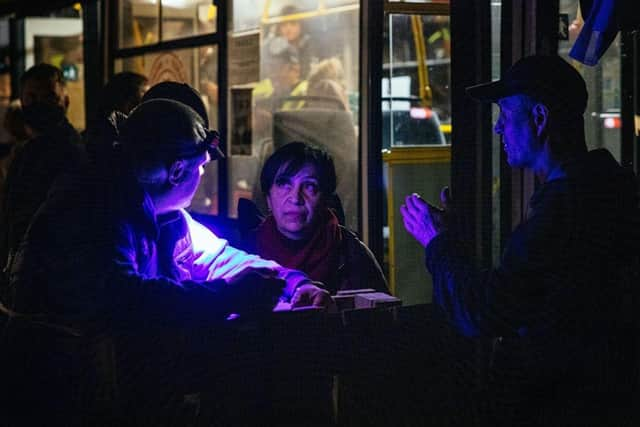War in Ukraine: Russia in ‘serious violation’ of laws of war by forcing Ukrainians to travel to Russia, report says
Russian and Russian-affiliated forces have been forcibly transferring Ukrainian civilians, including those fleeing hostilities, to the Russian Federation or areas of Ukraine occupied by Russia, Human Rights Watch said in a report released today.
The 71-page report, “‘We Had No Choice’: ‘Filtration’ and the War Crime of Forcibly Transferring Ukrainian Civilians to Russia”, documents the transfers of Ukrainian civilians, which is said were a “serious violation” of the laws that constitute war crimes and potential crimes against humanity.
Advertisement
Hide AdAdvertisement
Hide AdThe report also said Russian and Russian-affiliated authorities subjected thousands of Ukrainian citizens to a form of compulsory, punitive and abusive security screening called “filtration”.


“Ukrainian civilians should not be left with no choice but to go to Russia,” said Belkis Wille, senior crisis and conflict researcher at Human Rights Watch and co-author of the report. “And no-one should be forced to undergo an abusive screening process to reach safety.”
Human Rights Watch interviewed 54 people who went to Russia, went through filtration, had family members or friends who were transferred to Russia, or who supported Ukrainians trying to leave Russia. Most had fled the Mariupol area, and several were transferred from the Kharkiv region. Human Rights Watch also interviewed dozens of civilians from the Mariupol area who were able to escape the war zone to Ukrainian-controlled territory without undergoing filtration.
Human Rights Watch wrote to the Russian government in July with a summary of its findings and questions, but received no response.
Russian and Russian-affiliated officials organised transport for people fleeing the besieged south-eastern port city of Mariupol. They told some civilians they had no choice but to stay in Russian-occupied areas or go to Russia and should “forget about” going to Ukrainian-controlled territory.
“Of course, we would have used the opportunity to go to Ukraine if we could have, for sure,” said a woman transferred from Mariupol. “But we had no choice, no possibility to go there.”
Others said military or other personnel at checkpoints instructed fleeing Ukrainians to go to Russia or the “Donetsk People’s Republic”, an area of the Donetsk region controlled by Russian-affiliated armed groups and occupied by Russia. Military personnel who rounded up civilians in occupied territories told them the same. People who had the financial means could organise their own transport to Ukrainian-held territory.
Residents from some villages and a city in the eastern Kharkiv region, bordering Russia, were also forcibly transferred to Russia. A 70-year-old man from Ruska Lozova village said Russian forces told him “you lived under us and so if the Ukrainian army comes, they will punish you”, and claimed they would be executed if they stayed.
Advertisement
Hide AdAdvertisement
Hide AdWhile he did not give in, hundreds of families from the village did leave for Russia.
Some people said they went to Russia voluntarily, including men avoiding Ukraine’s martial law, which, with limited exceptions, does not allow men aged 18 to 60 to leave the country.
Although the total number of Ukrainian civilians transferred to Russia remains unclear, many were displaced and transported in a manner and context that makes them illegal forcible transfers, Human Rights Watch said. In late July, the Russian News Agency (TASS) reported more than 2.8 million Ukrainians had entered the Russian Federation from Ukraine, including 448,000 children.
Some of those who had access to smartphones and social media networks were able to connect with activists who helped them leave Russia for Estonia, Latvia or Georgia. At the border, though, some had difficulties because they had left their identification documents behind when they fled Ukraine.
The laws of war prohibit Russian or Russian-affiliated forces from forcing Ukrainian civilians, individually or en-masse, to evacuate to Russia. A forcible transfer is a war crime and a potential crime against humanity and includes a transfer in circumstances in which a person consents to move only because they fear consequences such as violence, duress or detention if they remain, and the occupying power is taking advantage of a coercive environment to transfer them.
Transferring or displacing civilians is not regarded as justified or lawful on humanitarian grounds if the humanitarian crisis triggering the displacement is the result of unlawful activity by the occupying power.
During the “filtration” process, which thousands of residents from the Mariupol area were forced to undergo while trying to flee, Russian and Russian-affiliated officials in the Russian-occupied region typically collected civilians’ biometric data. This included fingerprints and front and side facial images. They also conducted body searches, and searched personal belongings and phones; and questioned them about their political views.
A man from Mariupol said he and dozens of Mariupol residents stayed for two weeks in a village schoolhouse under filthy conditions before they were taken to undergo filtration. He said many got sick and feared what awaited them. “We felt like hostages,” he said.
Advertisement
Hide AdAdvertisement
Hide AdHuman Rights Watch said while Russia may have legitimate grounds to conduct security screening on people voluntarily seeking to enter Russian territory, the filtration process – in its scope and the systemic manner in which Ukrainian civilians were forced to undergo it – was punitive and abusive, had no legal underpinnings, and violated the right to privacy.
People who “failed” the process, apparently due to their suspected ties to the Ukrainian military or to nationalist groups, were detained in Russian-controlled regions, including at the detention centre in Olenivka, where at least 50 Ukrainian detainees were reportedly killed during a blast on July 29.
“Herding people further into Russian-occupied areas and onward to Russia without consent should immediately stop,” Ms Wille said. “ Russian authorities and international organisations should do everything they can to help those taken to Russia against their will who want to return home to be able to do so safely.”
Comments
Want to join the conversation? Please or to comment on this article.
